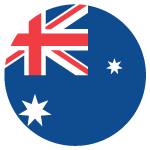
Study in Australia
Study in Australia
Australia is ranked third among the most popular overseas education destinations in the world and there are plenty of reasons to study in Australia. Eight out of the top 100 universities globally are located in this vibrant country making it an attractive choice for a wonderful destination.
The combination of a world-class education system, diverse work opportunities and a fantastic lifestyle can quickly capture the attention of those looking to pursue higher education at an international school, college or university. Whether you choose to focus on the arts or sciences, you’ll discover unbeatable academic excellence everywhere you turn. With over 22,000 courses available across more than 1,100+ institutions and universities students are warmly welcomed as they seek globally recognized degrees and tremendous growth opportunities.
As a graduate student from Australia, you can be confident in your ability to find the best jobs, irrespective of region or country. This success is largely due to Australia’s innovative and creative education style which makes a real difference in preparing students for the job market.
For those considering this journey working with Australia education consultants can provide essential support. A study in Australia consultant can assist you in navigating application processes visa requirements and course selections. Their expertise is invaluable, especially for Indian students looking to make the most of their educational experience. By collaborating with skilled consultants you can ensure a smooth transition as you embark on your path to study in Australia for Indian students and achieve your academic and career goals.
Education System in Australia
The education system in Australia is unlike any other country’s education system. It’s wholly unique and equipped with world-class academics. Apart from education, the personal experiences you gain in this majestic country highlight its significance as a fantastic education destination. From basic education to diverse courses you’ll observe a systematic process that the Australian government and its institutions follow to enhance the personal and professional lives of students.
In addition to traditional academic programs, you’ll discover various practical and vocational courses that shape your knowledge and expertise. For those who wish to study in Australia the range of options available is impressive making it a top choice for international students.
For study in Australia for Indian students seeking guidance from Australia education consultants can be incredibly beneficial. A qualified study in Australia consultant can help navigate the complexities of the education system ensuring you make informed decisions about your studies. By working with these experts you can select the right courses and institutions setting you on a path to success in your educational journey. Let’s glance at the process of how the education system works in Australia.
Primary school
It’s a preliminary schooling experience provided to the children at the age of 5 years. The primary schooling continues till the students reach their 12 years of age. Throughout this schooling experience, a child becomes fully prepared to pursue advanced education.
Secondary School
After preliminary schooling, students are sent to secondary school at the age of 12. But those students can’t be promoted to the next grade if they haven’t yet completed their ‘junior high school.’ Children can discontinue their education after this and think about pursuing further courses. For instance, after ‘junior high school,’ students can pursue vocational education or apprenticeship training.
Tertiary School
After completing their secondary school, students now prepare themselves for Tertiary (higher) education. Such as, students step into their bachelor’s, masters, and doctoral degree programs. However, every year a large percentage of international students are reported to visit Australia for Tertiary school.
Types of Courses in Australia
When considering your options for higher education, understanding the various types of courses available in Australia is essential. Australia boasts a diverse range of programs catering to different academic interests and career goals. Whether you’re looking for undergraduate degrees, postgraduate studies, vocational training or specialized short courses.
Many students choose to study in Australia for its world-class education system and innovative teaching methods. To navigate this variety and select the right path for your career, it’s beneficial to consult with Australia education consultants. These experts can provide valuable insights and guidance tailored to your aspirations, ensuring you make informed choices about your educational journey.
Vocational Education & Training (VET)
This course duration is only one or two years and is offered by plenty of colleges and private institutions in Australia. The VET includes-
Diploma
It includes 1-2 years of the full-time course for a professional qualification.
Advanced diploma
It’s a dual-sector qualification which includes the training sector, vocational education, and higher education sector. A student also gets an option to pursue a bachelor’s degree course.
Associate degree
This two years of education program focuses on students’ standard work skills progression and amplifies their expertise and academic performance. If you want to get into a bachelor’s degree program, then an associate degree can provide you credit transfer, but fields should be similar.
Bachelor degree
The bachelor’s degree program’s duration may vary as per the education that a student wants to pursue. It may take three years or four years to earn a bachelor’s degree in Australia.
Foundation courses
It’s more recommended to the international students who want to build a strong career in the medical/science/paramedical stream, but they aren’t ready with the minimum scores required to proceed with further education.
Postgraduate education
A student who wants to have their postgraduate education must be present with their bachelor’s degree first. However, the admission for the ‘Master program’ is also split into categories, such as ‘Master Degree by Coursework’ ‘Master Degree by Research’ and ‘Professional Master Degree.’
Doctoral Degree
The last level of education makes a student expert in a particular subject, providing the stamp of expertise to his knowledge. The student who wants to pursues Doctoral Degree is required their Master’s degree in the specific field.
Academic Year
In Australia, the academic years start typically from the beginning of February and end in November. Few universities also accept admissions in July.
Most universities and vocational institutes in Australia conduct the exams at the end of June and November. Few institutions follow three-semester patterns, while most others follow a four-semester pattern.
Visa Guidelines
As an international student, you’ll first require to apply for admission to your desired university in Australia. Similarly, you receive an offer letter from the designated university.
You complete further process to obtain the eCoE (Electronic Confirmation of Enrolment) that you check-in once you receive proper guidance from the university. After that, you’ll have to be ready with tuition fees and other fees required from overseas students to study in Australia.
In the end, you receive eCoE, and now you’re ready to apply for the student visa. But, make sure you’ve passed the English tests and able to fulfill the language requirements required to study in Australia.
Work After study in Australia
The students must obtain a study after 12th visa. Once this visa expires they are required to either leave the country or apply for a work permit visa to continue their stay. This is particularly important for students looking to secure employment in Australia immediately after graduation.
There are several visa options available for those wishing to work after studying in Australia. These include:
- 402 Training and Research Visa: Sponsored by an employer this visa allows students to gain valuable work experience.
- 485 Skilled Graduate Temporary Visa: This visa permits graduates to stay in Australia for 18 months to gain work experience relevant to their field of study.
- 487 Regional Sponsored Visa: This option allows students to work for three years and paves the way toward permanent residency.
- 885 Skilled Independent Residence Visa: This visa enables graduates to live and work in Australia as permanent residents without needing a sponsor.
- 886 Skilled Sponsor Resident Visa: Sponsored by an application this visa serves as a pathway to permanent residency.
- 887 Skilled Regional Residence Visa: This allows graduates to live and work permanently in Australia subject to certain conditions.
The Indian students aspiring to study in Australia, seeking guidance from Australia education consultants can greatly assist in navigating the visa application process. Engaging with a study in Australia consultant can provide crucial insights and support helping students make informed decisions about their educational journey and future career opportunities.
Permanent Residency
The above-stated visas are the most successful gateway to earn PR in Australia. However, getting PR in Australia is somewhat similar to the USA’s Green Card; still, the opportunities for getting PR in Australia are high.
Because the PR is based on a point system in Australia, and if you’re proficient in earning a minimum of 65 points, you can get PR. A student obtains these points based on his/her courses, expertise, college/university, language proficiency, work experience, etc. Points between 80 to 85 mean you’re sooner going to become a permanent residence of Australia.
List Of Universities
- The University of New South Wales, Sydney (CRICOS Code 00098G)
- The University of Queensland, Brisbane (CRICOS Code 00025B)
- The Monash University, Melbourne (CRICOS Code: 00008C)
- The University of Adelaide, South Australia (CRICOS Code 00123M)
- The University of Newcastle, Callaghan (CRICOS Code 00109J)
- Queensland University of Technology, Brisbane. (CRICOS Code 00213J)
- Curtin University (CRICOS Code: 00301J)
- Macquarie University, Sydney (CRICOS Code 00002J)
- RMIT University, Melbourne. (CRICOS Code 00122A)
- Deakin University, Melbourne & Geelong. (CRICOS Code 00113B)
- University of South Australia, Adelaide. (CRICOS Code 00121B)
- University of Tasmania, Hobart, Launceston and Sydney (CRICOS Code 00586B)
- Griffith University, Gold Coast & Brisbane (CRICOS Code 00233E)
- James Cook University, Townsville and Cairns (CRICOS Code 00117J)
- James Cook University, Brisbane. (CRICOS Code 00117J)
- Swinburne University of Technology, Melbourne. (CRICOS Code 00111D)
- La Trobe University, Melbourne. (CRICOS Code 03312D)
- La Trobe University, Sydney Campus. (CRICOS Code 00115M)
- Flinders University, Adelaide. (CRICOS Code 00114A)
- Western Sydney University, Parramatta. (CRICOS Code 00917K)
- CQ University Australia, Sydney, Melbourne, Brisbane & Perth. (CRICOS Code 00219C)
- Southern Cross University, Gold Coast, Lismore and Coffs Huour (CRICOS Code 01241G)
- Southern Cross University, Sydney, Melbourne & Perth. (CRICOS Code 01241G)
- University of Southern Queensland, Toowoomba, Queensland (CRICOS Code QLD 00244B, NSW 02225M)
- University of Southern Queensland Sydney Education Centre. (CRICOS Code NSW 02225M)
- Australian Catholic University, North Sydney, Melbourne, Brisbane, Canberra, Adelaide. (CRICOS Code 00004G)
- Charles Sturt University, Wagga Wagga, Sydney, Melbourne & Brisbane. (CRICOS Code 00005F)
- Federation University, Melbourne & Sydney (ATMC). (CRICOS Code 000103D)
- University of Sunshine Coast, Melbourne & Sydney (ATMC). (CRICOS Code 01595D)
- Victoria University, Sydney Campus. (CRICOS Code 02475D)
- Le Cordon Bleu, Adelaide, Sydney, Melbourne & Perth. (CRICOS Code 02380M)
- La Trobe College, Melbourne. (CRICOS Code 03312D)
- Deakin College, Melbourne. (CRICOS Code 01590J)
- Edith Cowan College. (CRICOS Code 01312J)
- Griffith College, Gold Coast & Brisbane. (CRICOS Code 01737F)
- Sydney Institute of Business & Technology. (CRICOS code 01576G)
- South Australia Institute of Business & Technology, Adelaide. (CRICOS Code 02193C)
- Curtin College, Perth. (CRICOS Code 02042G)
- Eynesbury College, Adelaide. (CRICOS Code 00561M)
- Newcastle International College. (CRICOS Code 03293B)
- Western Sydney University Sydney City Campus (CRICOS Code 00917K)
- University of Canberra College, Canberra (CRICOS Code 00212K)
- Australian College of Applied Psychology, Sydney (CRICOS Code 01328A)
- James Cook University College (CRICOS Code 00117J)
- Australian National University College, Canberra. (CRICOS Code 01682E)
- Flinders International Study Centre, Adelaide. (CRICOS Code 01682E)
- Taylors College, Perth & Sydney (CRICOS Code 01682E)
- The University of Sydney- Foundation Programs (Through Taylors College) (CRICOS Code 00026A)
- UTS Insearch, Haymarket, New South Wales (CRICOS Provider Codes: UTS Insearch 00859D, UTS 00099F)
- Australian Technical & Management College, Melbourne. (ATMC CRICOS Code 03013D)
- SAE Institute, Brisbane, Sydney, Melbourne, Adelaide & Perth. (CRICOS Code 003121)
- The University of Adelaide College (CRICOS Code 00123M)
- ECA Graduate Institute (CRICOS Code 02997M)
- Asia Pacific International College, Sydney & Melbourne. (CRICOS Code 03048D)
- English Language School in Sydney. (CRICOS Code 02644C)
- Sarina Russo Institute, Brisbane (CRICOS Code 00607B)
- International College of Management Sydney. (CRICOS Code 01484M)
- The Imperial College of Australia, Melbourne. (CRICOS Code 02858M)
- Education Access Australia, Melbourne. (CRICOS Code 02450B)
- Institute of Technology, Perth (CRICOS No: 03567C)
- Canterbury Business College, Sydney (CRICOS Code 01899K)
- Canterbury Technical Institute, Brisbane (CRICOS Code 02938M)
- Canterbury Language Academy, Sydney (CRICOS Code 02534J)
- Airways Aviation, Gold Coast and Sunshine Coast (CRICOS Code 00296A)
- Amber Aviation Academy, Melbourne (CRICOS Code 03462A)
- Monash College International Twinning Program











